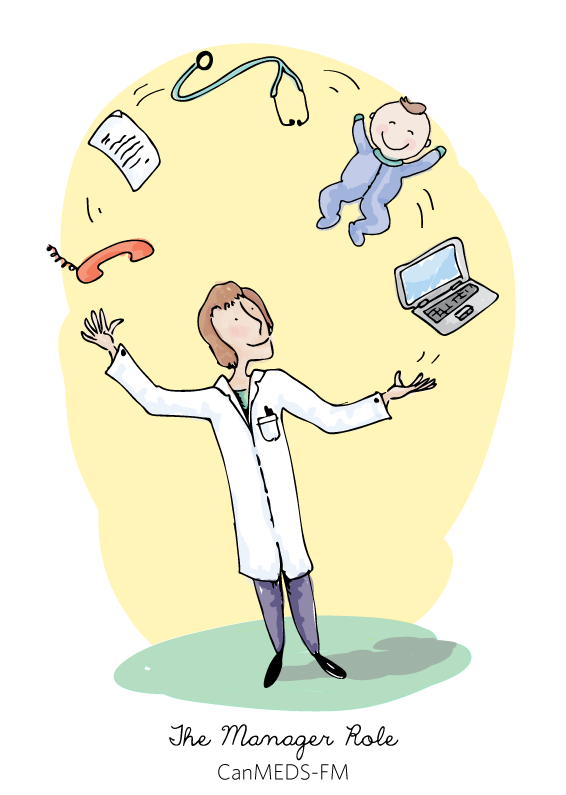CanMEDS-FM: the role of Manager
Jul 18th, 2012 by Lisa Jeans
By Dr. Steve Beerman
A resident asked me why “Manager” is an important CanMEDS-FM role. I advised the resident that this role was important to keep the other roles functioning at a high level. You cannot have best practices if you do not schedule your time, your interests, and your patients in an effective manner. The most frustrating things in medical practice are issues about personal and professional management of self and others.
Your great skills as a family physician may be ineffective if you are not organized in a manner that maximizes your special interests and your time on the issues that you can assist. If you are doing things that others are better able to do, you will be frustrated and more likely to find fault with your career choice. If you are intimidated or uncomfortable with the patient/system needs and your skill, you will feel incompetent.
Best practice managers will avoid these negative experiences and will provide a supportive working environment for you and for your colleagues. Your management of the application of your considerable knowledge and skills is as important as the knowledge and skills themselves.
Patients need your management knowledge and skills to stickhandle through their issue within the medical system. Without this support your patients would have greater challenges to achieve the care they need. We all work in health care systems with finite resources. We need to contribute to the effective utilization of the available resources and balance that with your patients’ needs. These are challenging manager tasks.
Physicians are increasingly part of health care teams. The modern physician must participate effectively in teams as leaders and followers. The skills to know when to change roles and how to function in each role allows the modern physician to be more influential and more effective. Physicians who lack these manager skills find shared care and teamwork frustrating. Physicians without meeting management skills can make a meeting painful for themselves and others.
Work/life balance is a challenging aspect of a medical career. In your role as manager you can ensure that you remain in good balance with work and other life priorities. Without this manager role you are at risk for anxiety, depression, burn-out and the unfortunate negative life impacts.
The manager role has a set of skills and knowledge that is important to your well-being. If you are less interested in this role, you should collaborate and seek advice from someone who has an interest and skills as a manager. Accepting advice from those with more knowledge skills and experience is one of those important manager skills. Try to learn as many manager skills as possible.
Dr. Steve Beerman is the Site Director for the Nanaimo Site of the UBC Family Practice Residency Program and the Chair of the Resident Resilience Subcommittee.
Illustration by Lindsay Gowland.
